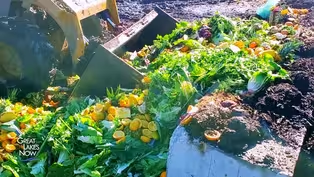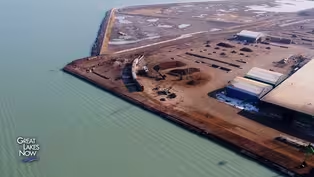
The Catch
Clip: Season 3 Episode 6 | 8m 13sVideo has Closed Captions
The Catch is Great Lakes Now’s one stop shop for bite-sized news about the lakes you love.
Keep up with the Great Lakes’ biggest issues. Find out how environmental challenges are impacting your enjoyment of the outdoors and the health of the ecosystem. Go beyond the headlines with reporters from around the region.
Problems playing video? | Closed Captioning Feedback
Problems playing video? | Closed Captioning Feedback
Great Lakes Now is a local public television program presented by Detroit PBS

The Catch
Clip: Season 3 Episode 6 | 8m 13sVideo has Closed Captions
Keep up with the Great Lakes’ biggest issues. Find out how environmental challenges are impacting your enjoyment of the outdoors and the health of the ecosystem. Go beyond the headlines with reporters from around the region.
Problems playing video? | Closed Captioning Feedback
How to Watch Great Lakes Now
Great Lakes Now is available to stream on pbs.org and the free PBS App, available on iPhone, Apple TV, Android TV, Android smartphones, Amazon Fire TV, Amazon Fire Tablet, Roku, Samsung Smart TV, and Vizio.
Providing Support for PBS.org
Learn Moreabout PBS online sponsorshipAnd now it's time for the catch where we take you around the Great Lakes to hear from reporters about the issues they're covering.
Bite-sized news briefs about the lakes you love.
Plus a look at an annual summer bike ride happening in Michigan's upper peninsula.
- [Narrator] If Michigan's upper peninsula makes you think of wilderness smoked fish and pasties, you are not alone.
But one thing you may not associate with the UP, is road cycling, and one man is on a mission to change that - We wanna show people all the safe roads available to ride their bike in the Upper Peninsula.
There are way too many vehicle to bike crashes around the entire country.
Bikers are looking for safe places, safe routes to ride their bike.
- [Narrator] According to the Centers for Disease Control and Prevention nearly 1000 bicyclists die and more than 130,000 are injured in crashes that occur on roads in the United States every year.
But in Michigan's Upper Peninsula there were only three fatalities and 15 serious injuries from accidents involving cyclists between the years of 2017 and 2021.
- And so the bike ride that we take people on showcases all of these quiet roads.
And it is a loudspeaker for the country to realize that the Upper Peninsula is full of quiet, paved, back country roads that not enough people know about.
- [Narrator] And that's precisely why in 2018 James created toward the Tour Da Yoop, Eh.
It's a 1,200 mile long loop divided into 10 sections that takes riders through the beautiful landscapes and towns of the UP, over the course of 10 days.
- Unique thing about the Upper Peninsula is it's a big landmass, but it's skinny.
And so it's an easy place to create this type of a loop logistically where you could do a section of it and then it's only 50 or 60 miles to ride your bike back to where you started.
- Since starting Tour Da Yoop, Eh, James has been pushing officials to adopt road safety and planning measures that take cyclists into account.
- And they see these safety measures are logical and rational and they take a little while to implement but the knowledge of them and the implementation of them is benefiting the entire State of Michigan.
And a lot of these practices can get applied throughout the rest of the country, as well.
More and more people are biking in the UP.
They're seeing it as a safe place.
We're having so much fun meeting people from around the country and inviting them to take on our plaid jersey challenge, and make it to the Hall of Plaid when they get all 1,200 miles done.
(air whooshing) - [Narrator] The US Army Corps of Engineers reports that the long-term average rise in Lake Superior's April water level is three inches.
Which means that at this rate, the lake could reach record levels this summer.
Mark Toregrossa, a meteorologist for MLive, has the story.
- The way Lake Superior and all the Great Lakes water levels are measured is a bunch of points are taken, measured with levels and then they're all averaged together over the course of several days.
That way it takes away the wind fluctuations the wave fluctuations and whatnot and gives us an average level or average height of the water level.
One inch of water on Lake Superior is equal to 500 billion with a B, gallons.
If it goes up another three inches it'll have another 1.5 trillion with a T, gallons of water in it.
That's a hard amount of water to imagine - [Narrator] But the water levels of all the Great Lakes do not necessarily rise and fall together.
- If you remember two years ago or so Lake Michigan and Lake Huron, Lake Erie, Lake Ontario were all at record high water levels and have since dropped considerably.
The interesting thing about Lake Superior's water levels, right now, this year, is they are going the opposite direction of a lot of the other Great Lakes.
And now Lake Superior is only three inches below its record high water level for this time of the year.
The cause of this is precipitation.
The Lake Superior Drainage Basin which is the area surrounding Lake Superior, where where the rainfalls all drains in the Lakes Superior that has had very heavy above normal amounts of precipitation.
- [Narrator] Mark believes that global warming is an underlying cause and that lake levels could be more variable in the future.
- It means the cycles that we've seen over hundreds of years could be more accentuated.
The heat brings energy, energy turns into storms.
So we're finding that we have wetter winters.
When the lakes normally fall, they're getting water in them and they rise.
But also with the heat, if we go into a dry pattern the evaporation can be stronger, higher and lake levels can go down.
So it's a very volatile up and down situation.
(air whooshing) - Nor Dan Wanschura is the Executive Producer and host of Interlock and Public Radio's Points North Podcast.
- Points North is a podcast about the land, water and inhabitants of the Great Lakes.
We wanna tell the stories of this region.
- [Narrator] One recent story highlighted in incident involving some anglers willing to do anything to win fishing competitions.
- Fish competitions are common throughout the Great Lakes region.
And what people might not know is there's oftentimes thousands of dollars at stake in these competitions.
Expensive boats, sponsorship deals.
And when you have a lot of money involved in a competition there's always the possibility that some people are gonna cheat.
So this particular episode, we hone in on two specific fishermen, Chase Cominsky and Jacob Runyan.
And they fish what's known as the Lake Erie Walleye Trail.
It's a series of competitions held on Lake Erie throughout the year.
And this particular event is held at Cleveland.
It's their championship event, and they are about to win the grand prize, the tournament prize, when the Tournament Director decides to double check their catch, and when he slices open the fish lead weights are discovered inside the fish.
There's a total of 10 lead weights adding seven pounds to their total catch.
All hell breaks loose from there and it's a scandal that really rocks the competitive fishing world - [Narrator] To combat the cheating, the tournaments have taken some extraordinary measures.
- I did talk to other anglers who suggested cheating has existed in these fishing tournaments ever since they've existed.
You're always gonna have guys trying to find ways around the rules.
And so one of the measures that's been put in place is to have the winners actually take polygraph tests lie detector tests to prove that they won the tournament, and they were following the rules.
- [Narrator] And let this be a lesson that it never pays to cheat.
The consequences for Kaminsky and Runyon were pretty severe.
- Chase Kaminsky and Jacob Runyon were charged with a handful of felonies.
They actually ended up taking a plea deal.
They were sentenced to 10 days in jail, $2,500 dollar fine, and they forfeited $130,000 dollar boat.
So that was the consequence.
It was no small potatoes sort of crime.
They paid for it in a big way.
- Thanks for watching.
Battling Food Waste for People and the Planet
Video has Closed Captions
Clip: S3 Ep6 | 8m 6s | Learn how keeping food waste out of landfills can help to fight climate change. (8m 6s)
A Community Fights For A Cleaner Future
Video has Closed Captions
Clip: S3 Ep6 | 8m 23s | They live in one of the most polluted areas of the Great Lakes and they’re fighting back! (8m 23s)
Providing Support for PBS.org
Learn Moreabout PBS online sponsorship
- Science and Nature

Explore scientific discoveries on television's most acclaimed science documentary series.

- Science and Nature

Capturing the splendor of the natural world, from the African plains to the Antarctic ice.












Support for PBS provided by:
Great Lakes Now is a local public television program presented by Detroit PBS

